Funny Thing People Do in There Sleep
We like to think that sleep is the time of peace and quiet, when we power down and pull back from the craziness of the world to recharge and reset. But for many of us, the minute we shut our eyes and doze off is when the truly weird stuff starts happening. From sleepwalking to violently acting out your dreams, here are all of the weird things human beings are capable of during slumber. And if you find any of this happening to you in the wee hours, don't miss the 10 Genius Tricks for Falling Back Asleep in the Middle of the Night.

Some somnambulists—the technical name for "sleepwalkers"—have been known to actually get behind the wheel and drive. One women, who had been taking Ambien for about two years, told Women's Health about her experience: "I woke up in my car. I was in my pajamas, driving and crying. I knew where I was, but I had no idea how I got there, and I didn't know why I was crying, either. I pulled into a parking lot and waited until I was done crying for no apparent reason, and then I just drove back home. It had to have been like 3 o'clock in the morning. I did continue to take Ambien for a little bit after that incident because my insomnia was really bad and I didn't know what else would work." For stuff thatwill work, however, check out the 11 Doctor-Approved Tricks For Falling Asleep Faster—Tonight.

Sleepwalking is often a side effect of night terrors. This combo of sleep and wakefulness—yes, also known as somnambulism—usually leads those experiencing it to do mundane things like sit on their bed or walk to the bathroom. But others have proven more adventurous. One 19-year-old named Taylor Gammel woke up in her Denver home, started sleepwalking, and didn't stop until she'd walked nine miles (while wearing sweatpants, a t-shirt, and no shoes). And for more on sleep, learn the 10 Best Tips For Sleeping on a Plane.

Other sleepwalkers have gone the other direction: Up. In some cases, sleepwalkers have been known to climb to significant heights, whether up many flights of stairs or even scaling structures. For example, a London teenager was found sleeping at the top of a 130-foot crane, walking across a narrow metal beam to get there. Seriously. And for more on sleep, learn what happens to your body when you try "clean sleeping" for two weeks.

Studies have found that grabbing or otherwise provoking someone while they are sleepwalking can cause them to lash out, whether they have violent tendencies or not. "[U]nder the right circumstances that any sleepwalker might respond to a perceived threat or close proximity with violence," writes Mark R. Pressman, PhD, of Sleep Medicine Services at Lankenau Hospital. "Families are frequently advised to not touch or grab sleepwalkers during episodes as they may resist physically."

Yup—sleepwalkers have even been known to commit murder. A number of cases have been recorded in which sleepwalking led to homicide, such as a serviceman who strangled a woman while sleepwalking, or a man who killed his father and later did not remember having done so.
While both those cases led to acquittals, the sleepwalk defense doesn't always work. A woman living in Phoenix woke up to find her husband trying to fix the pool pump with a hunting knife—while in the midst of a somnambulist haze. He'd later claim that he reacted to the disturbance by stabbing her 44 times and dragging her to the pool. The jury was not convinced and convicted the man of first-degree murder. And for more amazing sleep advice, here's Why You Should Sleep With Your Feed Outside the Covers.

When self-help gurus tell you to "live your dreams," Rapid Eye Movement Sleep Behavior Disorder is not really what they had in mind. This is a disorder in which people literally act out their dreams.
"REM sleep is when our dreams occur and usually we're paralyzed during this stage of sleep. In REM sleep behavior disorder, people are not paralyzed like they should be and can act out their dreams by screaming, kicking, punching, and throwing around their limbs," explains Roman's Dr. Doron. "It can cause injuries to the person or someone sharing the bed with them. People with REM sleep behavior disorder will often remember a dream that corresponds with their movements, but they aren't intentionally causing themselves, or others, harm."
He adds that the disorder is sometimes an early indicator of a more serious nervous system disorders like Parkinson's Disease.
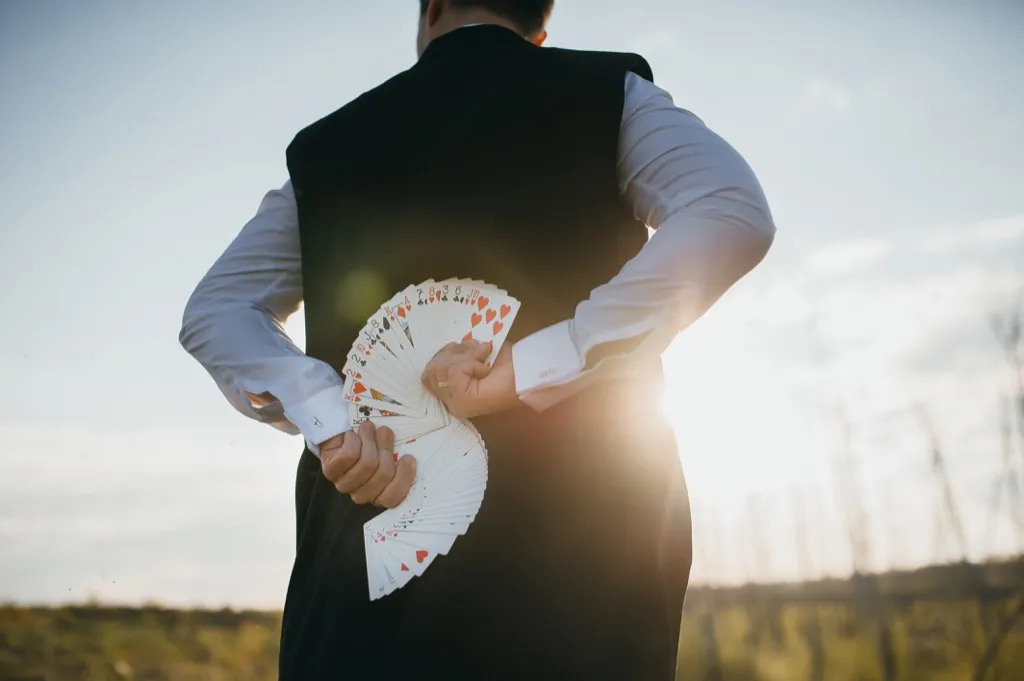
Backe adds another skill that some are able to show off while unconscious: bending the world to our whims.
"Lucid dreaming is one of the most amazing things a human can experience," he says. "The ability to control your dreams is not only beneficial for cognitive purposes, but it can also help you sort things out in your life. There are people who become so adept at lucid dreaming, they can literally turn to the figments of their imagination—mid-dream, mind you—and ask them what it is they are manifesting, and how can they (the sleeper) help themselves."
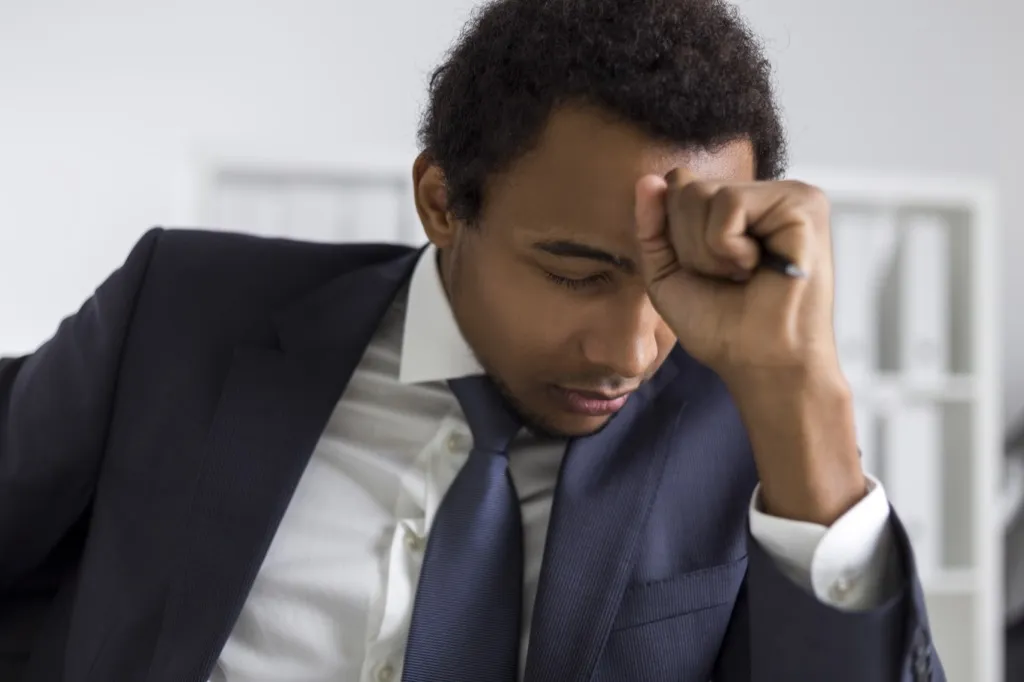
Well, not literally, but some people do suffer from a condition known as Exploding Head Syndrome.
"People with exploding head syndrome hear extremely loud noises—a gunshot, an explosion, a thunderclap—as they're drifting off to sleep, or as they wake up from a deep sleep," says Dr. Joyce Lee-Ionotti at Banner University Medical Center Phoenix. "Most researchers find that exploding head syndrome often occurs in people who are dealing with high levels of stress and physical or mental fatigue. It affects both men and women, though the condition appears more commonly in women, and among people 50 years and older." If you find yourself exceptionally stressed, learn the 30 Best Ways to Conquer Stress—For Good.

Speaking of erections, Dr. Tzvi Doron, clinical director at men's health service Roman, says that these Sleep Related Erections (also known as Nocturnal Penile Tumescence) occur a lot more often and remain much longer than you might expect.
"Men normally have about five erections during sleep each lasting about 25 minutes during a typical eight-hour sleep," says Doron.
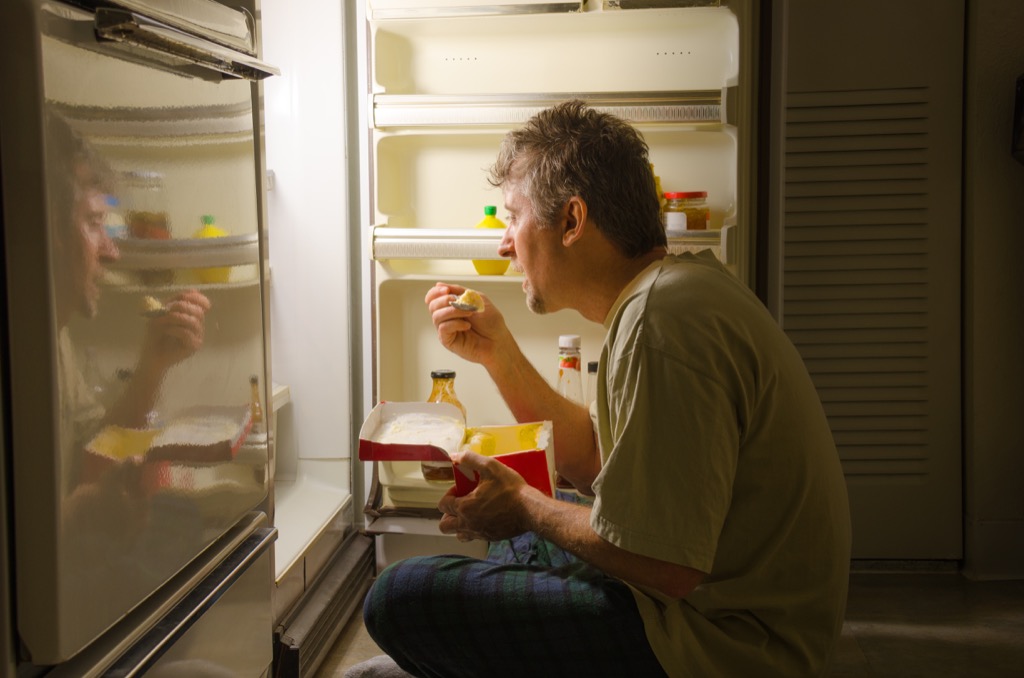
Some people actually head straight to the fridge and chow down while unconscious—something called Nocturnal Sleep Related Eating Disorder. "This is considered a parasomnia (sleep related disorder)," explains Doron. "They have no memory of eating when they wake up. One study estimated that almost 5% of the population has this disorder and it can be the cause of unexplained weight gain. Medication can be effective in treating this disorder, but it first has to be diagnosed correctly." If that sounds like you, consider stocking your fridge with the 50 Foods That Make You Look Younger.
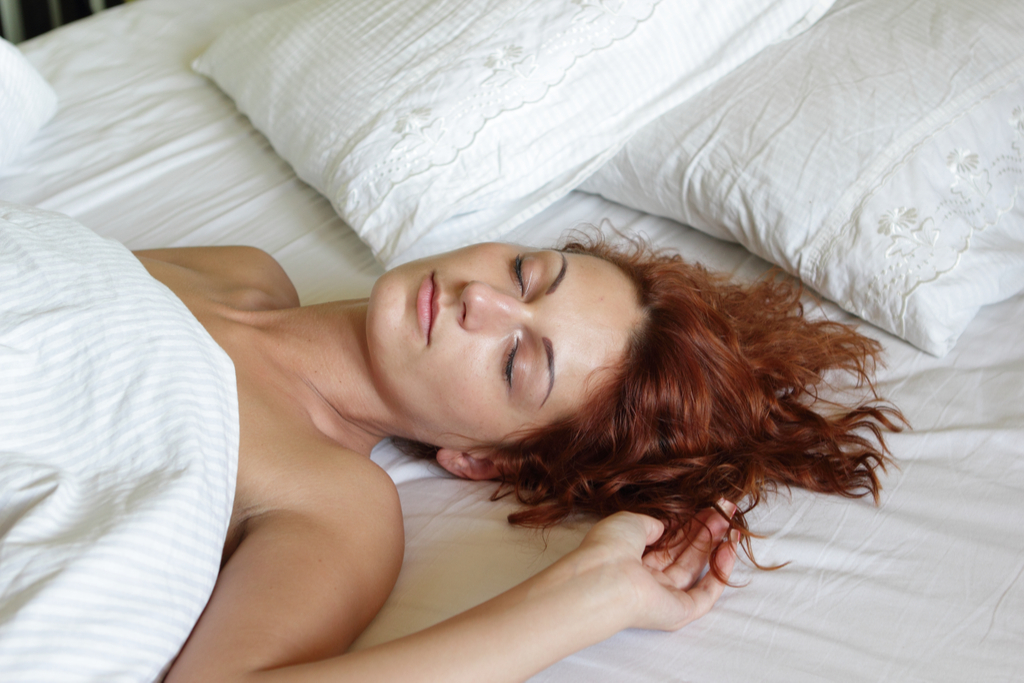
Natural body functioning leads us to lose a lot of fluid during the night, due to sweating and even just exhaling.
"Have you ever breathed on a window or a mirror and seen fog?" asks Fischer. "We emanate moisture every time we exhale. This, in addition to sweating, is the reason people often wake up very thirsty in the mornings."
She adds that experts estimate that a person loses about a liter of fluid a night.

The filtering that your kidneys are regularly doing—removing toxins from your bloodstream and producing urine—slows down as you sleep.
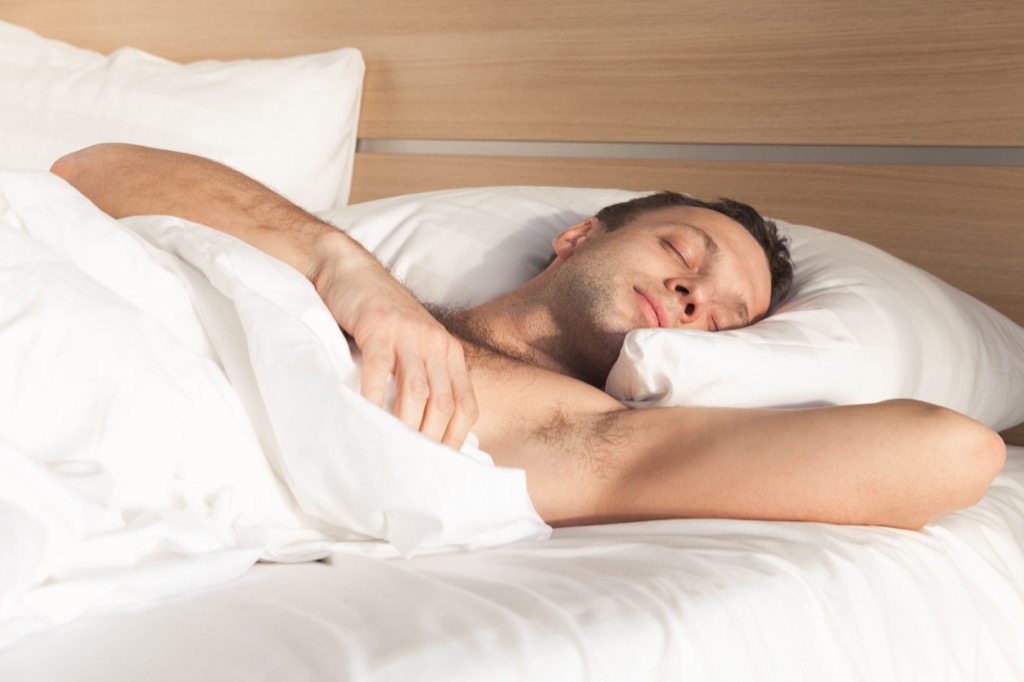
On the other hand, sleeping increases the release of growth hormone. Researchers estimate that as much as 75 percent of human growth hormone is released during sleep (much of it during Stage 3 sleep, which usually sets in about an hour after falling asleep).
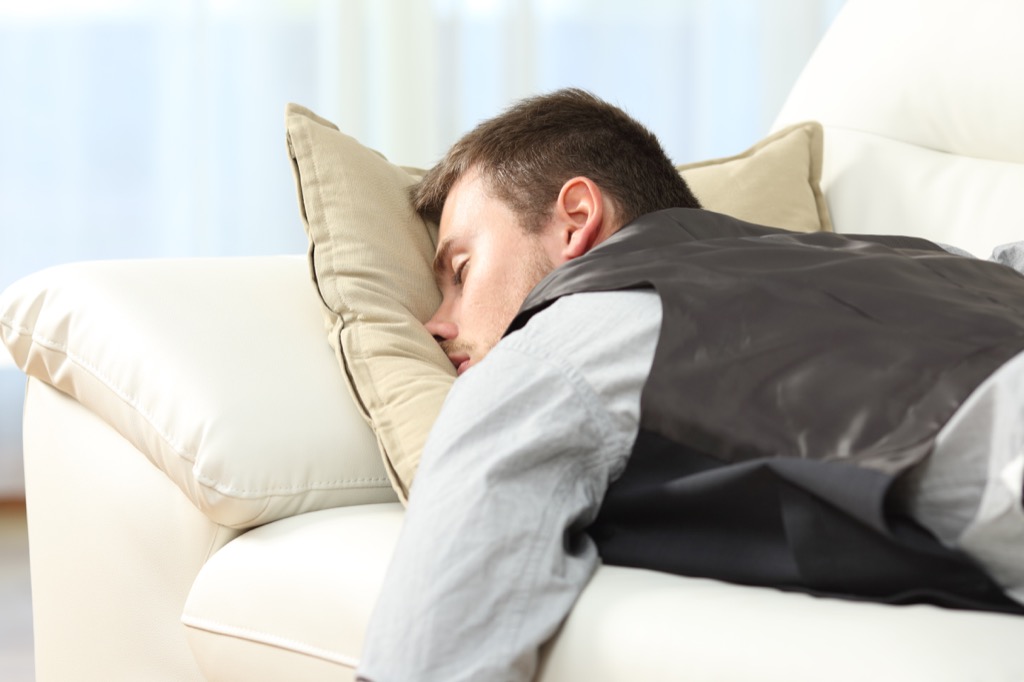
While you might literally fall out of bed, a more common situation is the sensation of falling which can lead you to feel like you are falling off a cliff or skydiving. The reason for feeling this?
"There are a number of theories why these occur but essentially it is when the effects of sleep are just beginning to take over your body and brain, your waking self seems to creep back in unexpectedly sometimes, startling you awake," says Lee-Ionotti. "Hypnic jerks are a moment of harmless fright, sometimes triggered by fatigue, stress, sleep deprivation and stimulants." And for more great health advice, here's What Your Hip-to-Waist Ratio Says about Your Health.
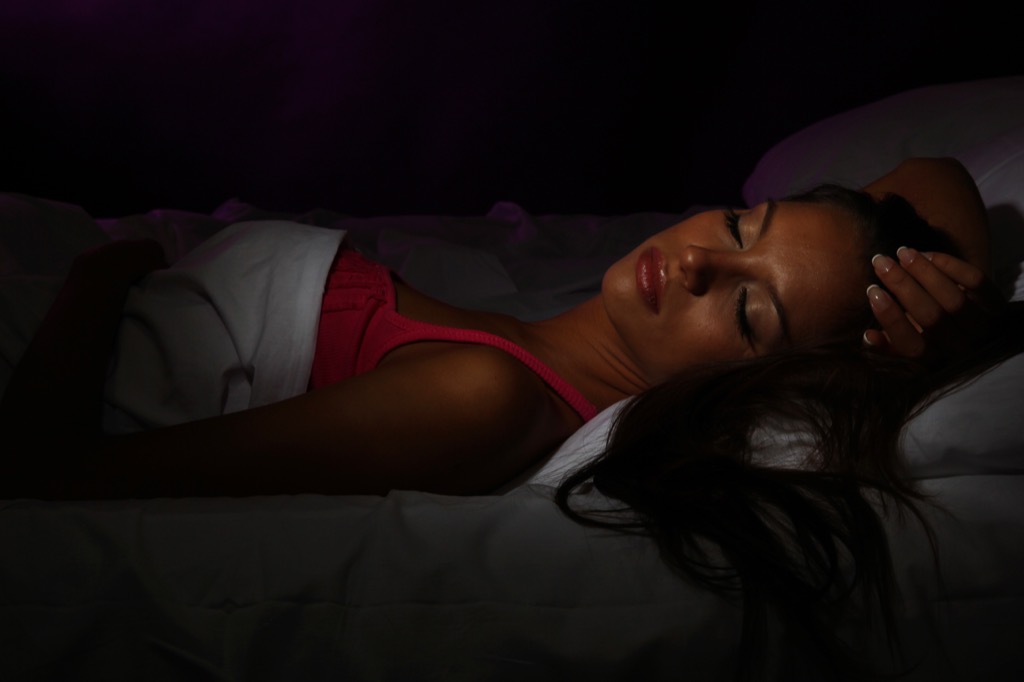
One of the most dangerous sleep-related things is when you don't do something. Sleep apnea, which affects an estimated 22 million Americans, is a condition in which muscles in the back of the throat fail to keep the airway open and your airway becomes blocked. The disruption in normal breathing can last from a few seconds to a few minutes. While it's not likely that you'll die of suffocation, apnea has been associated with high blood pressure, headaches, and even heart failure.
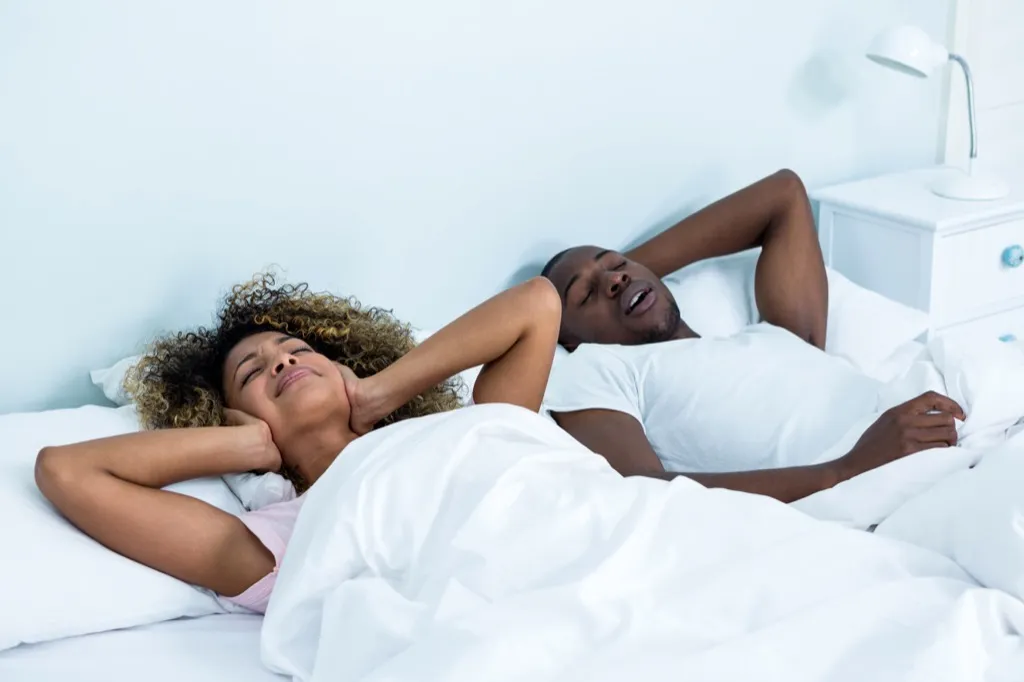
Plenty of people snore, but there are some super-snorers out there who do it so loud that they rattle windows and can be heard blocks away. That was the case of Jenny Chapman, a British grandmother who snores at 111.6 decibels—eight decibels louder than a low-flying jet sounds. That volume level was measured at a "snoring boot camp" where chronic snorers gathered to try and overcome their affliction. "The experts said it was the loudest they had ever experienced," the woman said. "I can sympathize with my husband now who is always complaining." If that sounds like you, read up on the 5 Reasons You're Snoring Every Night—And How to Stop It.
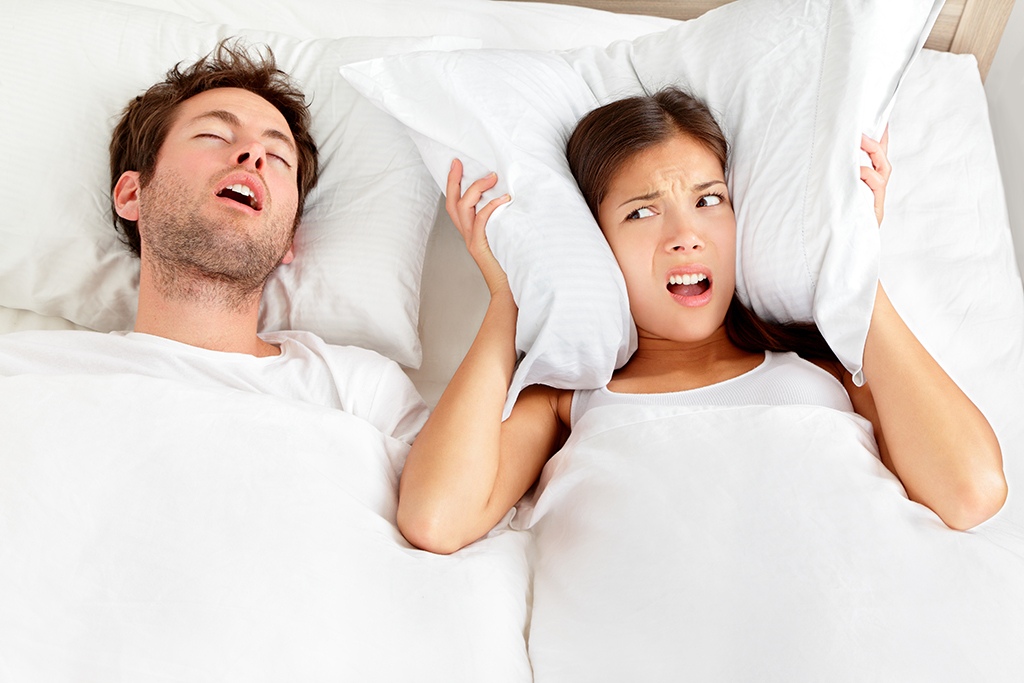
Another crazy snore sound, also care of the good old Daily Mail, is that of this guy, in a video that went viral in which he makes an ear-splitting high-pitched squeaking noise. According to the doctors that the Daily Mail spoke with, this is likely due to a swollen larynx, which narrows the airway and prevents vocal chords from moving apart as they are supposed to.
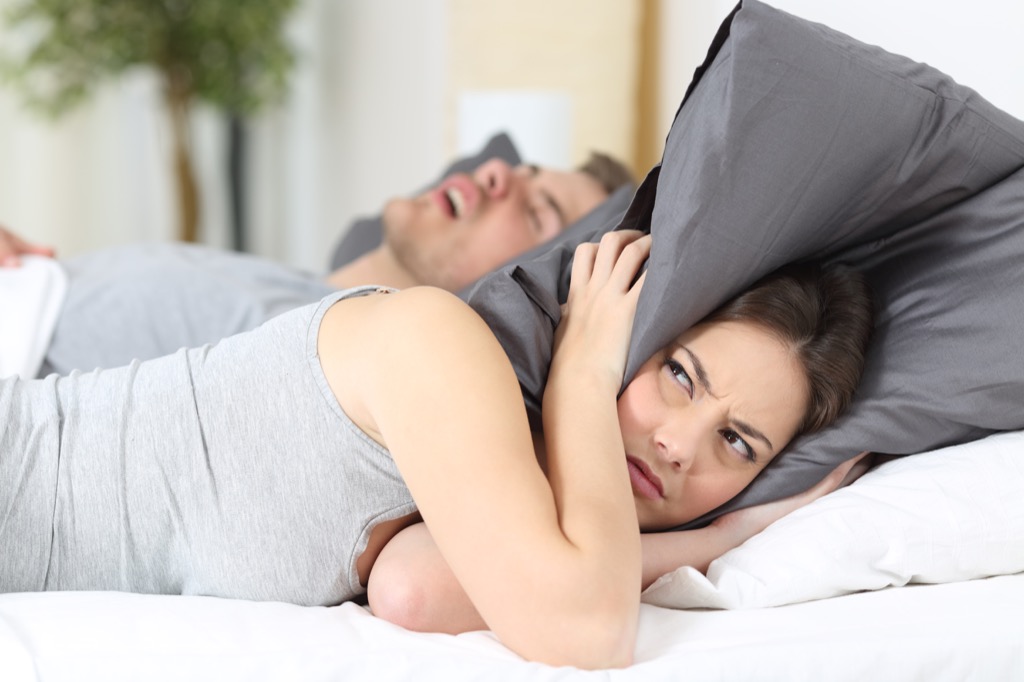
All right, one more crazy snore sound. This one was uncovered by Buzzfeed, capturing a braying breathing that sounds less human than billygoat. If you find yourself making any of these noises, learn how to stop snoring once and for all.
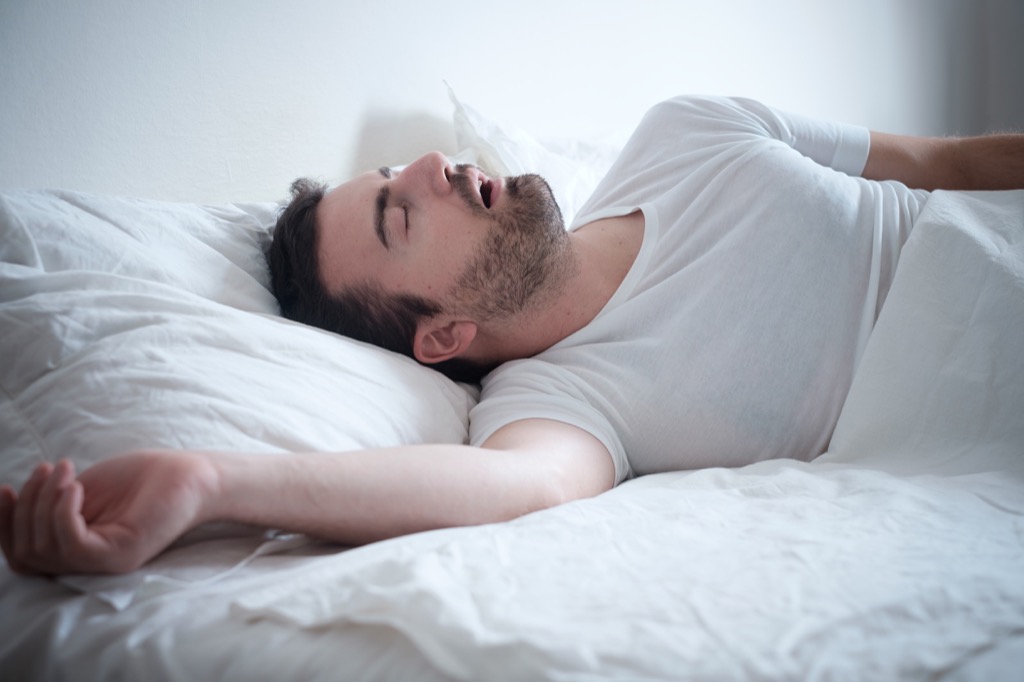
Some people are prone to serious twitching during their sleep, a condition called hypnagogic jerk—which usually occurs in the transition from sleep to wakefulness.
"The unconscious muscle jerks are most common in children and are often at random, although they can be triggered in some instances by noise or light," says SleepZoo's Brantner. "This often accompanies the feeling of falling. So if you've ever had one of those quick dreams as you're falling asleep that you've tripped or fallen off something and you're jarred awake, you're likely experiencing hypnagogic jerk."
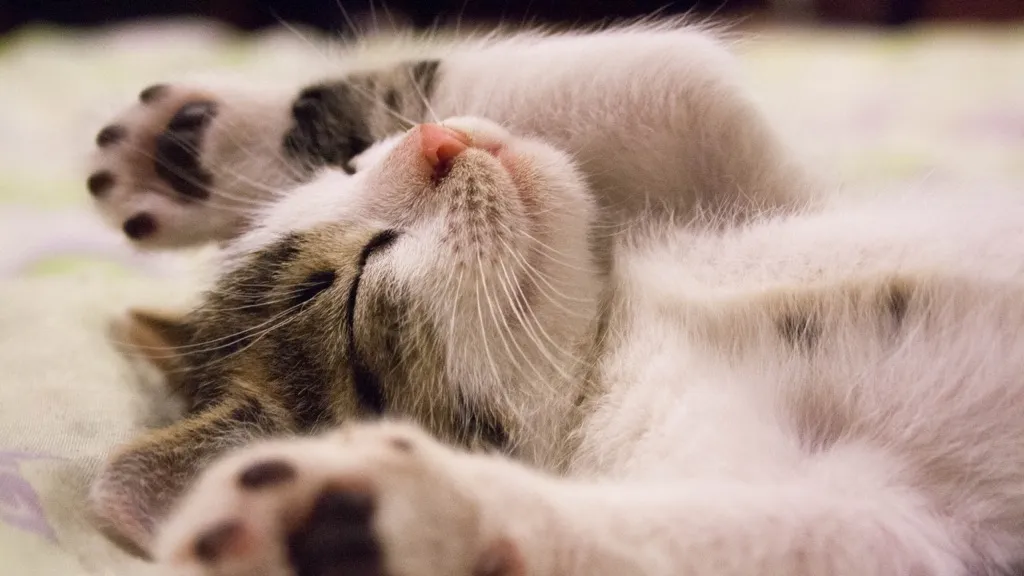
While nightmares can be frightening, far scarier may be sleep paralysis. "This is where you think you're awake and you can't move," explains Brantner. "This is often associated with intense feelings of fear, as well as potential hallucinations such as evil figures hovering above you."
What's actually happening is that you're beginning to wake in the middle of the REM sleep cycle and your body hasn't returned to full functioning. "This gives you the feeling that you're paralyzed," he says. "During this state, you'll often drift between sleep and wakefulness (it's a blurry line), which is really where the hallucinations or vivid imagery come in." In short: It's a terrifying experience.

Night terrors—a foreboding sense of fear not necessarily connected with imagery like we'd typically have in nightmares—can lead the sufferer to freak out, screaming and crying out, sometimes even opening their eyes. They are most common in children, though the Sleep Association suggests that about 2% of adults suffer from them.

In dreams, you can do all sorts of superhuman things, from flying to beating back an army. But sleeping can also give you surprising super-skills in the real world, as well. Another writer to Women's Health describes her own experience. "Once while sleepwalking, I got a piece of glass in my foot, pulled it out, stuck a paper towel to the bleeding wound, and went back to sleep, only to find a bloody paper towel in my bed in the morning," she writes. "Another time, I woke up as I was opening my front door to a very large man yelling outside my apartment. He was yelling at someone on his phone, and when I opened the door, he was like four feet from me. He just looked at me weirdly and walked away. Thank god. That was when I realized I should start dead-bolting my door at night."

Besides getting behind the wheel, sleepwalking can also lead you into extremely dangerous situations that if you don't wake up in time, could mean injury or even death. For example, James Currens woke up to find himself in an alligator-infested lake. He fortunately had enough wits about him to respond and save himself. Sleepwalker Timothy Brueggeman was not so lucky. He left his home in -16-degree Fahrenheit temperatures and ended up freezing to death.
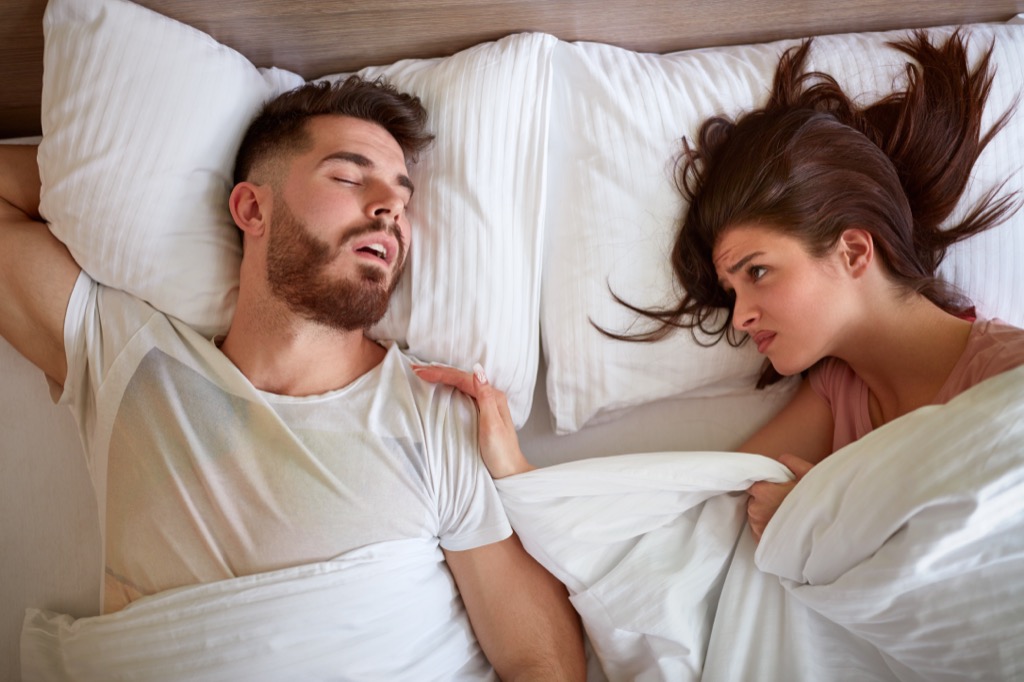
Just as we can walk in our sleep, we also can jabber away. You may mumble or speak in clear, fully formed sentences. But similar to somnambulism, this is "not a product of the conscious or rational mind," according to the Sleep Foundation (which means it is not admissible in court should you admit to murder or lesser crimes—while sleepwalking or otherwise).
"Sleep talking is actually a sleep disorder known as somniloquy," says Lee-Ionotti. "Researchers don't know a lot about sleep talking, like why it happens or what occurs in the brain when a person sleep talks. The sleep talker isn't aware that they're talking and won't remember it the next day. If you're a sleep talker, you may talk in full sentences, speak gibberish, or talk in a voice or language different from what you'd use while awake."
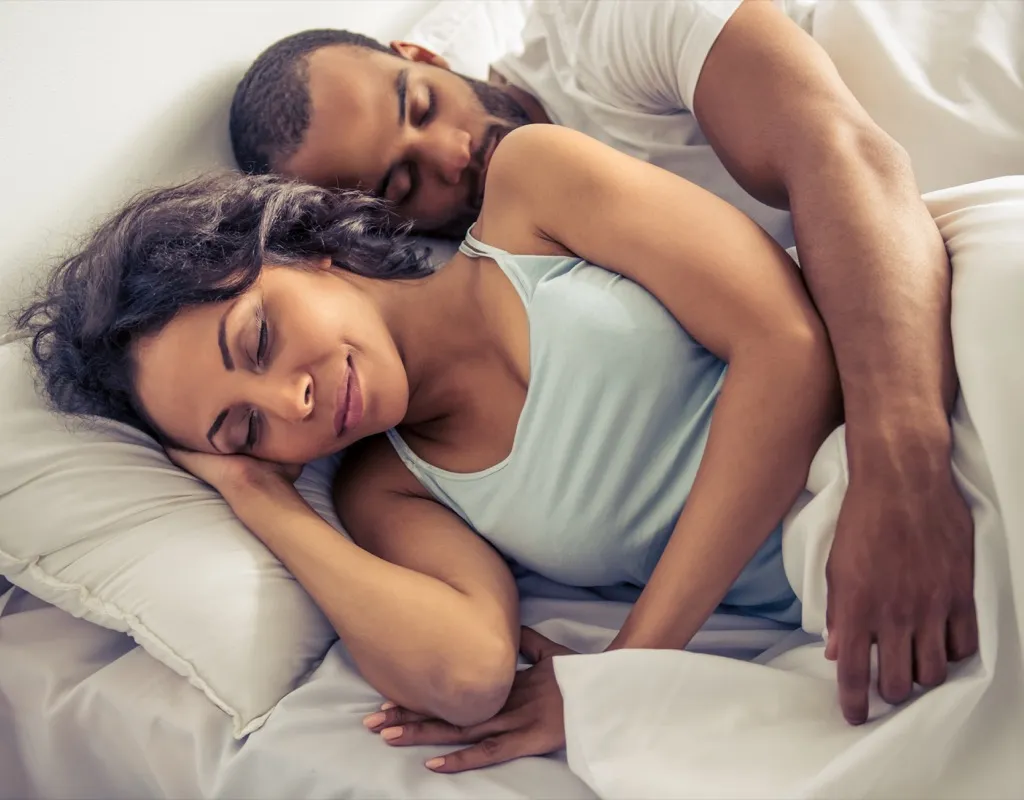
Well, you don't actually stop salivating altogether, but during sleep, the average person significantly reduces the amount of saliva that they produce. "This reduction in flow is part of our circadian rhythm," explains Nima Dayani, DDS, MS, of Advanced Endodontics of NYC. "Saliva is responsible for continuously rinsing the mouth. It contains some immunoglobulins that fight the bacteria in the mouth that cause tooth decay or gum disease. Due to diminished salivary flow while we are sleeping, we end up waking up with a not-so-pleasant morning breath."
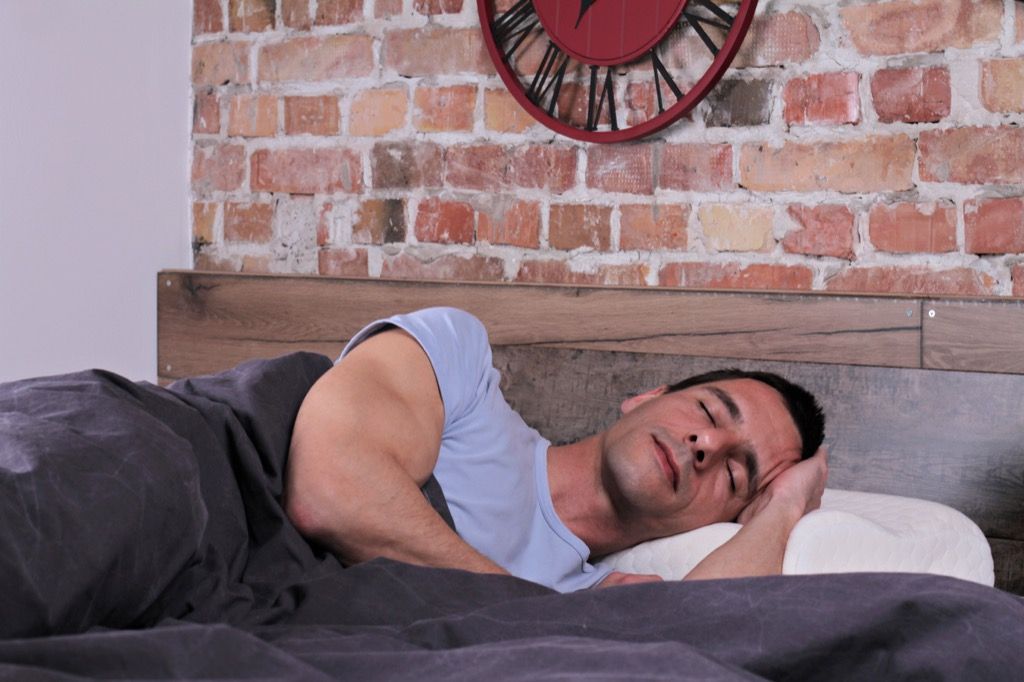
"Bruxim" is a fancy word for teeth grinding. This involuntary phenomenon affects a large number of people but can have a disastrous effect on your dental health.
"The amount of wear and tear that a bruxer sustains on his teeth in one night of bruxing alone, is often equivalent of a lifetime of chewing," says Dayani. "People in this population often crack perfectly healthy teeth that leads to needing immediate root canal treatment or often even extraction. Not a surprising outcome when considering your masticatory muscles are the strongest muscles in your body."

"During sleep, our brain reviews the day we had (or the week, the year, the decade), and catalogs different people, places, feelings, events, and memories in their appropriate compartments," explains Caleb Backe, a health and wellness expert at Maple Holistics. "We separate what we need from what we don't, and this is different for every individual. We trim the mental fat on the one hand, and introduce different ideas and visions which matter, through the symbolism of dreams."
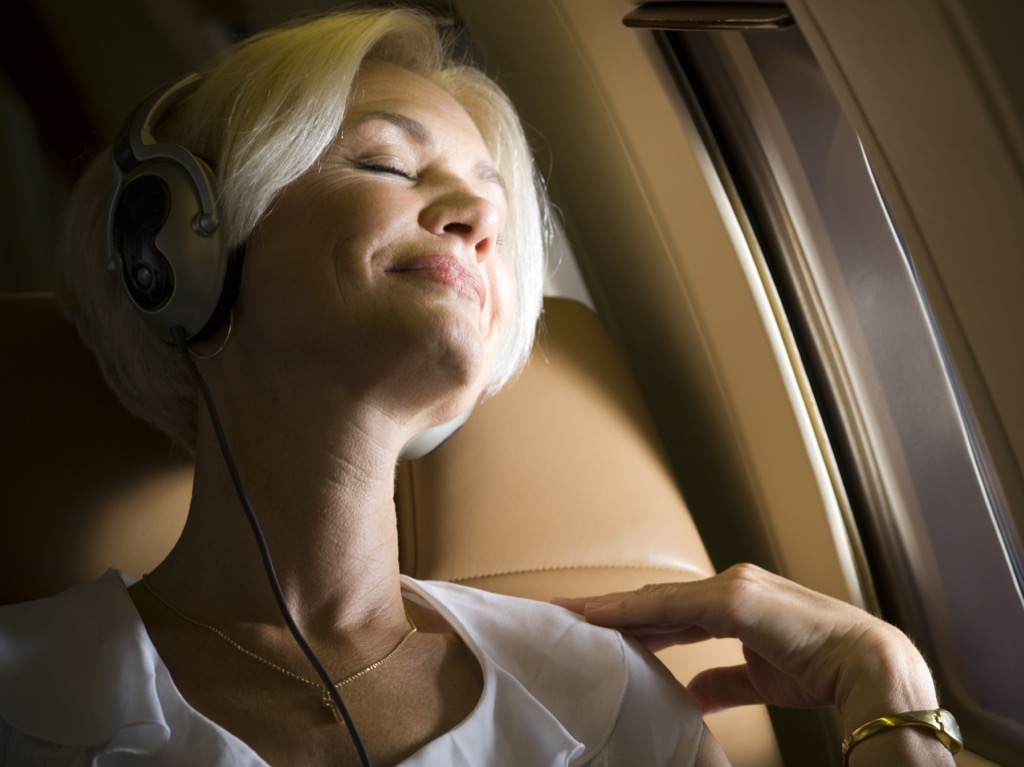
In addition to teeth gnashing, some people can unconsciously mutilate their own tongues. "Habitual nighttime tongue biting is another weird thing we do in our sleep," says Cynthia Rowland, a "facial fitness expert" and founder of Rejenuve, Inc. "This can cause tongue scalloping, where the sides of the tongue are "ruffled," or even bleeding. Tongue biting could be caused by stress and anxiety, like bruxism. Certain medications could cause tongue biting during sleep as well as illnesses and sleep disorders.

Just because you're unconscious doesn't mean you don't get turned on.
"During REM sleep, our breathing speeds up and heart rate intensifies," says Chris Brantner, Certified Sleep Science Coach at SleepZoo.com. "This often results in the increased blood flow and arousal of sex organs in both males and females for a period of time."
But he adds that contrary to popular belief, this doesn't necessarily relate to erotic dreams.
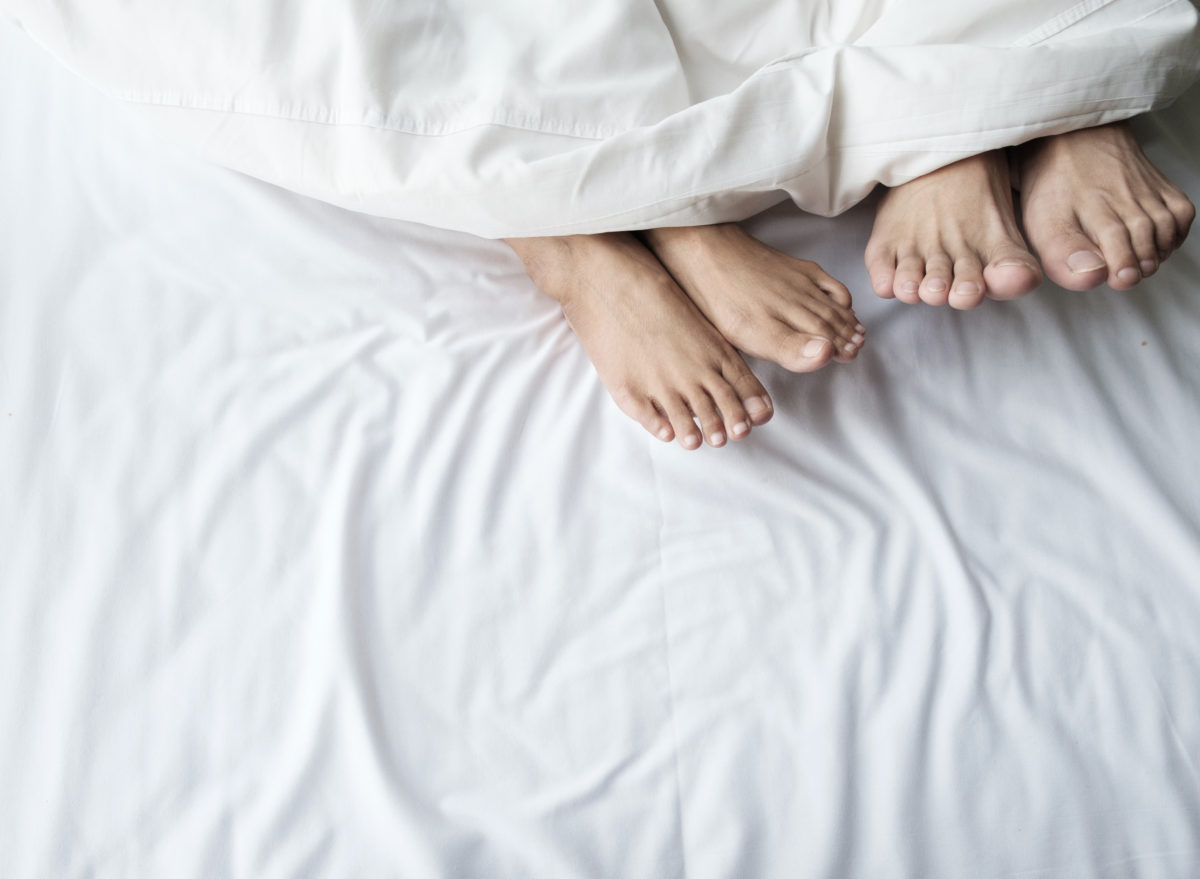
Forget getting aroused—some people actually have sex while sleeping. Called sexsomnia, this is a condition where people engage in involuntary sexual behavior during sleep. "It can include masturbation or attempts to have sex with someone in the same bed," explains Doron. "People who have it have no memory of the behavior in the morning. It is considered very rare and can sometimes cause relationship problems." And for more wild sleep trivia, learn how to debunk The 25 Most Common Sleep Myths.
To discover more amazing secrets about living your best life, click here to sign up for our FREE daily newsletter !
Source: https://bestlifeonline.com/weird-sleep-habits/
0 Response to "Funny Thing People Do in There Sleep"
Post a Comment